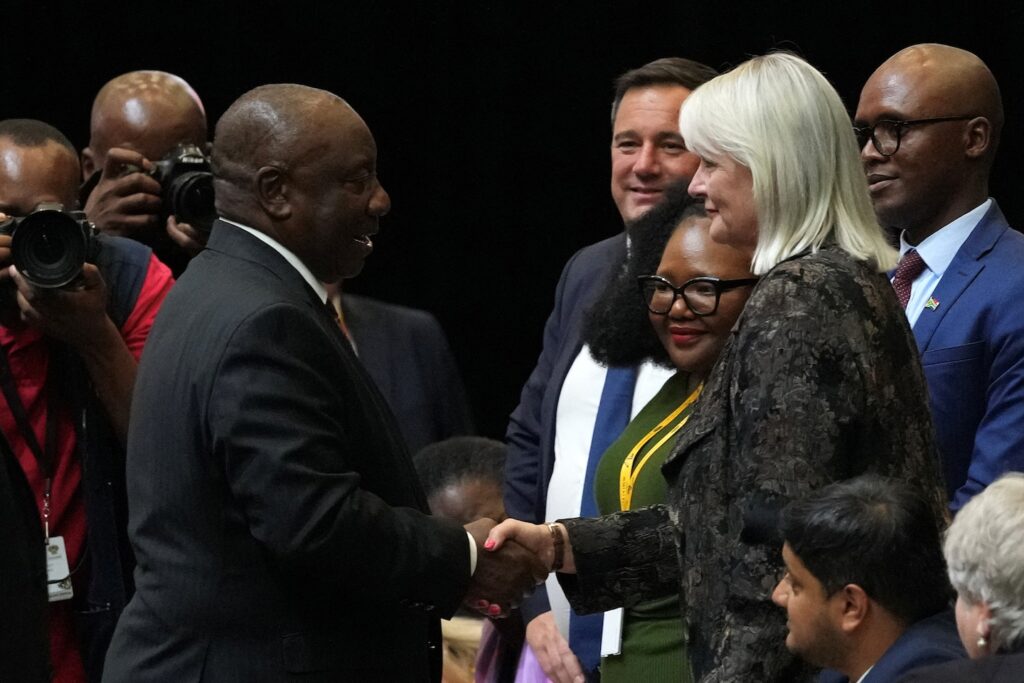That huge whoosh coming from the southern tip of Africa was the sound of a collective sigh of relief: South Africa's two largest parties, the ruling African National Congress and the long-standing opposition Democratic Alliance, had set aside their differences to form a national unity government and successfully re-elected Cyril Ramaphosa as president.
And that popping sound? It must have been the sound of heads exploding for the country's radical socialists, populists and nationalists, who could not accept the idea of the continent's oldest black liberation movement sharing power with a party known for representing wealthy white suburbanites.
Such a power coalition seemed unlikely before the May 29 general election, in which the ANC lost its parliamentary majority and needed a coalition partner to stay in power. But a sensible, centrist coalition would help South Africa tackle its many problems, attract foreign investment and realize its potential as the continent's economic powerhouse. The news sent stocks and the local currency, the rand, soaring.
The coalition also avoided what many South Africans feared was a “nightmare scenario”: an alliance between the ANC and extremists such as Julius Malema, a red-bereted socialist who called for the total nationalization of industry and the confiscation of white farmland, and Jacob Zuma, the corrupt ex-president who accelerated South Africa's decline during his time in office.
Zuma's new Zulu-dominated party, Umkhonto weSizwe (MK), came in third, with support from Zuma's heartland in KwaZulu-Natal. Malema's Economic Freedom Fighters came a close fourth. The two parties, calling themselves the League of Progressive Parliamentarians, formed an opposition coalition with other left-wing parties. Zuma denounced what he called an “immoral white-led alliance” between the DA and the ANC.
Zuma and Malema can still cause trouble in parliament, but for now they are relegated to the fringes. It must be particularly galling for Malema, a notorious racist who has chanted “kill the Boers,” or white farmers, that a white woman, Annelie Lotrie of the Democratic Alliance, serves as deputy speaker of parliament while he sits powerless in the opposition.
You know what they say about karma.
Achieving the governing partnership required some deft touching from Ramaphosa.
He called for a government of national unity after the ANC received only 40 percent of the vote, reminiscent of South Africa's first all-race democratic elections in 1994 after the end of apartheid. That year, the ANC won more than 62 percent of the vote, winning 252 seats in the 400-member National Assembly. Nelson Mandela was elected the country's first black president and, in a show of tolerance and reconciliation, he called on all other parties to join a government of unity and asked FW de Klerk, the country's last white apartheid leader, to become vice president.
This time, with just 159 seats, the ANC needed a partner to form a majority. President Ramaphosa cleverly called for a government of national unity and invited all competing parties to join him. President Malema summarily rejected a government that included the white-led Democratic Alliance. President Zuma, emulating Donald Trump, said the election had been rigged and ordered newly elected MK MPs to boycott the opening of parliament.
These self-defeating maneuvers enabled the ANC to form a coalition government with the DA, which won nearly 22% of the vote and 87 seats in Parliament, giving the coalition a large majority. Other smaller parties joined in, and extremists raged on the outside of government.
The new government will not be a natural or easy coalition, and it's unclear how long it will last. Cabinet posts will have to be split, and the parties will have to reconcile starkly different policy positions on everything from affirmative action for the black majority to curbing endemic corruption.
Foreign policy will be a particularly difficult challenge. The ANC has taken a pro-Russian stance in the war with Ukraine. DA leader John Steenhausen visited Ukraine for six days and said South Africa must “stand with the free world and take a firm stance against Russian aggression”. The ANC government has taken the case to the International Court of Justice over Israel's war in Gaza, and all ANC MPs supported a non-binding resolution to close South Africa's Israeli embassy and sever diplomatic ties. The DA opposed the resolution and has taken a more even-handed approach to the conflict.
As a former liberation fighter, the ANC was always bound by loyalty to old friends throughout its struggle, including Russia, Palestine, Cuba, Libya and China, but South Africa needs more trade and investment from Western countries, especially the U.S. This new centrist coalition gives President Ramaphosa an opportunity to sideline the more radical factions within his party and abandon some of the country's more controversial foreign policy positions.
A sensible, centrist government is what the majority of South African voters clearly want.
Perhaps this is a lesson for Europe, which is struggling with the rise of the far right after the European elections. And even in the United States, where centrist bipartisanship was once the norm, House Speaker Mike Johnson (R-Louisiana) has been criticized by the far right for relying on a centrist coalition with Democrats to avoid a government shutdown and pass key legislation.
If South Africa can pull this off, their model of unity could become the country's most valuable export.



